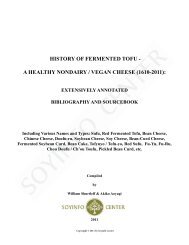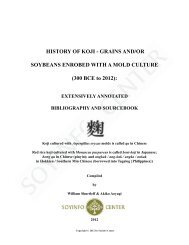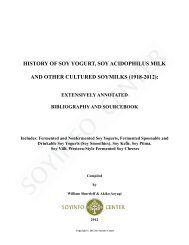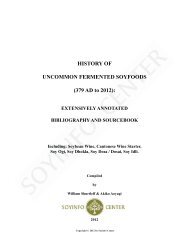- Page 1 and 2:
Copyright © 2012 by Soyinfo Center
- Page 3 and 4:
Contents Copyright © 2012 by Soyin
- Page 5 and 6:
What is natto? Natto is prepared (c
- Page 7 and 8:
1975 - In Natto Kenkosho (The Natto
- Page 9 and 10:
A&M = Agricultural and Mechanical A
- Page 11 and 12:
Pioneers - Individuals: Laszlo Berc
- Page 13 and 14:
Copyright © 2012 by Soyinfo Center
- Page 15 and 16:
Copyright © 2012 by Soyinfo Center
- Page 17 and 18:
Copyright © 2012 by Soyinfo Center
- Page 19 and 20:
DAWA-DAWA MADE IN WEST AFRICA FROM
- Page 21 and 22:
Copyright © 2012 by Soyinfo Center
- Page 23 and 24:
1. The legendary early discovery of
- Page 25 and 26:
However Kawakami and Kimura (1985)
- Page 27 and 28:
Yudôfu-Yudaufu: A food made from t
- Page 29 and 30:
the parcel.” See also letter abou
- Page 31 and 32:
you stir too much, the fi lm will n
- Page 33 and 34:
seen (June 2010) that uses the word
- Page 35 and 36:
of speech (n. = noun; v. = verb, et
- Page 37 and 38:
vegetable cheese, natto.” Bulleti
- Page 39 and 40:
soya casein or tofu, I infected 50
- Page 41 and 42:
of various Japanese soyfoods, inclu
- Page 43 and 44:
“Moromi: The grounds or lees left
- Page 45 and 46:
consumption. Domestic soybean produ
- Page 47 and 48:
p. 438-39] the microbes attached to
- Page 49 and 50:
Jenkins, Becke & Cosack, Kornauth.
- Page 51 and 52:
5 hours to render them very soft; t
- Page 53 and 54:
his ware and trampled it under foot
- Page 55 and 56:
[1843-1910] demonstrated clearly an
- Page 57 and 58:
of cases, viz., of marasmus and mal
- Page 59 and 60:
piculs; 1 picul = 132.277 pounds we
- Page 61 and 62:
USDA, USA. 88. Nature (La) (Paris).
- Page 63 and 64:
• Summary: From the Los Angeles T
- Page 65 and 66:
no other legume has produced, with
- Page 67 and 68:
101. New York Times.1912. Gives out
- Page 69 and 70:
table salt and several stimulants,
- Page 71 and 72:
and Surgeons, Baltimore, Maryland.
- Page 73 and 74:
Conclusion: The soybean originated
- Page 75 and 76:
cakes in the principal European cou
- Page 77 and 78:
e used successfully in the househol
- Page 79 and 80:
“the total digestible nutrients
- Page 81 and 82:
31): Coffee is known to be detrimen
- Page 83 and 84:
137. Itano, Arao. 1918. Soy beans (
- Page 85 and 86:
as an edible oil in the manufacture
- Page 87 and 88:
of natto]. Sapporo Norin Gakkaiho (
- Page 89 and 90:
(31) Test to maximize yield of prot
- Page 91 and 92:
have been among them. The soybean h
- Page 93 and 94:
manufacturing yields, digestibility
- Page 95 and 96:
two weeks in 1911 at the Arlington
- Page 97 and 98:
159. Oshima, Kokichi. 1923. Kôji-k
- Page 99 and 100:
manually at Madioen [Madiun, in Eas
- Page 101 and 102:
constituents of natto]. Nogaku Kaih
- Page 103 and 104:
New Product-Documentation: The Japa
- Page 105 and 106:
1922 April-The oil production depar
- Page 107 and 108:
Peking (at 86 Morrison Street, the
- Page 109 and 110:
alkalinity due to soda and potash,
- Page 111 and 112:
ean curd, green vegetable bean, soy
- Page 113 and 114:
had the pleasure of visiting the la
- Page 115 and 116:
Manchuria-Production. Estimate of t
- Page 117 and 118:
which soybeans are grown. Almost eq
- Page 119 and 120:
uses of soy oil and cake. The soybe
- Page 121 and 122:
Note 3. Cruz and West (1932, p. 78)
- Page 123 and 124:
cocoanut balls. For Nut fruitose: M
- Page 125 and 126:
soybeans in Portugal (1880 at the b
- Page 127 and 128:
in 1939, p. 339. The same character
- Page 129 and 130:
no baiyô-Zoku [Cultivation of natt
- Page 131 and 132:
256. Roux, Charles. 1941. Le soya [
- Page 133 and 134:
Dr. and veterinarian, villa Bel-Air
- Page 135 and 136:
2:77-83. [Jap]* 278. Niida, T.; Yas
- Page 137 and 138:
eginning titled (in Japanese charac
- Page 139 and 140:
a rich source of soybean varieties.
- Page 141 and 142:
the subculture media on the surviva
- Page 143 and 144:
selling fermented beans, which are
- Page 145 and 146:
iotin for growth, whereas the latte
- Page 147 and 148:
food for the future]. Ernaehrungs-U
- Page 149 and 150:
Science Section, this document may
- Page 151 and 152:
Agriculture, Hokkaido Univ., Sappor
- Page 153 and 154:
the nutritive value of natto and he
- Page 155 and 156:
are broiled, steamed, then put in a
- Page 157 and 158:
an processing, margarine and shorte
- Page 159 and 160:
in protein nutrition. The 45 resear
- Page 161 and 162:
Contents: Purpose of study. Method
- Page 163 and 164:
kisa ni tsuite (1) [On the formatio
- Page 165 and 166:
excellent for other types of cuisin
- Page 167 and 168:
473. Sakurai, K. 1964. The role and
- Page 169 and 170:
Physical properties and amino acid
- Page 171 and 172:
of fi gures. Map. Part I: Backgroun
- Page 173 and 174:
tofu dish. 70. Yudofu. 71. Miso. 72
- Page 175 and 176:
Rolling dry yuba. 164. Yuba on disp
- Page 177 and 178:
kakôhin no amino-san ni kansuru ke
- Page 179 and 180:
[shimi-dofu, kogori-dofu] (frozen t
- Page 181 and 182:
for lack of adequate markets for th
- Page 183 and 184:
type Ehrlich carcinoma cells. Chemi
- Page 185 and 186:
536. Hesseltine, C.W.; Wang, H.L. 1
- Page 187 and 188:
of “Co gamma-rays” on natto pre
- Page 189 and 190:
174-75). Grilled chicken with sweet
- Page 191 and 192:
Joan from Ener-G foods in Seattle],
- Page 193 and 194:
ascites carcinoma cells. “But whe
- Page 195 and 196:
76, at All Soul’s Day). Miso soup
- Page 197 and 198:
germination can be found within a 2
- Page 199 and 200:
cooked beans. (d) Cooking: Almost a
- Page 201 and 202:
If mechanical heat drying is to be
- Page 203 and 204:
hemicellulase from Bacillus subtili
- Page 205 and 206:
597. Hosking, Richard. 1972. A dict
- Page 207 and 208:
602. Nakao, Sasuke. 1972. Ryôri no
- Page 209 and 210:
Recently, Japanese scientists inclu
- Page 211 and 212:
Lecithin. Concerning tofu: Tofu mad
- Page 213 and 214:
author discusses tofu (and how to m
- Page 215 and 216:
practical concept and approach. Tha
- Page 217 and 218:
Rhizopus and Chlamydomucor strains
- Page 219 and 220:
contains the word “plasmids” (o
- Page 221 and 222:
are highly digestible because the b
- Page 223 and 224:
• Summary: Teriyaki sauce (p. 48)
- Page 225 and 226:
to Daraku nabe-Fukushima prefecture
- Page 227 and 228:
and modern soy protein products, th
- Page 229 and 230:
eturning to the Hamamatsu area in c
- Page 231 and 232:
each maker, there is one column for
- Page 233 and 234:
on “Basic ingredients,” is a su
- Page 235 and 236:
682. Liener, Irvin E. 1976. Nutriti
- Page 237 and 238:
Once you’ve tasted natto you can
- Page 239 and 240:
used extensively in Morocco; in fi
- Page 241 and 242:
in traditional foods, including rou
- Page 243 and 244:
pressurized steamer. Steam at 14.7
- Page 245 and 246:
© Copyright Soyinfo Center 2012 HI
- Page 247 and 248:
selection of natto types. 5. To mak
- Page 249 and 250:
1960, 2 million tonnes in about 196
- Page 251 and 252:
soyfoods in the Western world.” N
- Page 253 and 254:
Pharmaceutical Society of Japan) 98
- Page 255 and 256:
Doshisha University) 19:22-30. [Jap
- Page 257 and 258:
2. Univ. of Maryland. 771. Kawakami
- Page 259 and 260:
The Book of Tofu. New York: Ballant
- Page 261 and 262:
Vegetable Protein Food Assoc., 9th
- Page 263 and 264:
of Japan (Nippon Sakumotsu Gakkai K
- Page 265 and 266:
present and future. Based on an art
- Page 267 and 268:
• Summary: Contains a nice illust
- Page 269 and 270:
egional name. Shiro miso: white (or
- Page 271 and 272:
characters: Name of marketing compa
- Page 273 and 274:
milk curd), aburage (fried tofu pou
- Page 275 and 276:
and Worcestershire sauce in England
- Page 277 and 278:
products (soy fl ours, soy isolates
- Page 279 and 280:
Bacillus natto, Bacillus subtilis,
- Page 281 and 282:
© Copyright Soyinfo Center 2012 HI
- Page 283 and 284:
epresenting roughly 2,000 soybean v
- Page 285 and 286:
protein in tons/year. In 1971/1977
- Page 287 and 288:
1989-Nattosan. MG-0. Developed by A
- Page 289 and 290:
Tofu Assoc., Federation of Japan Na
- Page 291 and 292:
(miso) is plentiful. Soy sprouts ar
- Page 293 and 294:
chocolate), soybeans, soymilk (soym
- Page 295 and 296:
Natto Dip: Mix together 2 cups tofu
- Page 297 and 298:
911. Parker, Joyce. 1982. Re: Soyfo
- Page 299 and 300:
Junsei Yamazaki came to the USA in
- Page 301 and 302:
in California; her cooking has been
- Page 303 and 304:
(Deep fried) Tofu burgers-Tofuburge
- Page 305 and 306:
(both line drawings and simple brus
- Page 307 and 308:
shijitsu no kagaku seibun sosei oyo
- Page 309 and 310:
Food Science and Technology. See p.
- Page 311 and 312:
© Copyright Soyinfo Center 2012 HI
- Page 313 and 314:
and Hokkaido (25,908). The source o
- Page 315 and 316:
introduced it to the Natto Assoc. i
- Page 317 and 318:
History of miso in Europe: Early Eu
- Page 319 and 320:
unning a family business cleaning t
- Page 321 and 322:
Note: This is the earliest English-
- Page 323 and 324:
illustrations. Shows how to make na
- Page 325 and 326:
green soybeans, soybean sprouts, so
- Page 327 and 328:
oil, shortening oil, cooking and sa
- Page 329 and 330:
tau-foo, dou-fu, dau-fu). Soybean f
- Page 331 and 332:
Shokuhin) is a member of the Japane
- Page 333 and 334:
It is good boiled, grilled, or frie
- Page 335 and 336:
• Summary: Discusses: Ryoji Nakaz
- Page 337 and 338:
Gakkaishi (J. of the Japanese Socie
- Page 339 and 340:
Date of Introduction: 1984. Ingredi
- Page 341 and 342:
soy fl our, whole soy fl our, soybe
- Page 343 and 344:
death rate from stomach cancer, str
- Page 345 and 346:
salt or soy bean paste / miso. Hiya
- Page 347 and 348:
1084. Aoki, Sadao. 1985. Nattô oyo
- Page 349 and 350:
Vegetarian Times. Aug. p. 33-40. No
- Page 351 and 352:
[Studies on natto. III. Change in t
- Page 353 and 354:
1116. Watanabe, Sugio. 1985. [Manuf
- Page 355 and 356:
© Copyright Soyinfo Center 2012 HI
- Page 357 and 358:
and stews and will keep well in the
- Page 359 and 360:
Ryûgakuchû no Tai kagakusha keika
- Page 361 and 362:
appropriate to redefi ne the term p
- Page 363 and 364:
ground red pepper, is a unique food
- Page 365 and 366:
and value of tofu consumed per hous
- Page 367 and 368:
tofu (fuyu). For each food the foll
- Page 369 and 370:
170,000 tons of dawadawa are made.
- Page 371 and 372:
from natto Bacilli and Bacilli from
- Page 373 and 374:
ecovered consistently from 5 sample
- Page 375 and 376:
discusses soy sauce, konbu and nori
- Page 377 and 378:
From 1984 onwards it will require 2
- Page 379 and 380:
upon.” Address: [California]. 120
- Page 381 and 382:
an interest in tempeh: Mr. Katoh we
- Page 383 and 384:
production of Plasmin, further help
- Page 385 and 386:
The present expansion of soybeans i
- Page 387 and 388:
Shokuryo Gakkai-shi (J. of the Japa
- Page 389 and 390:
vegetable), katsuobushi (dried boni
- Page 391 and 392:
• Summary: The contents of this a
- Page 393 and 394:
Manufacturer’s Address: Tochigi-k
- Page 395 and 396:
USA and Europe, and concluded that
- Page 397 and 398:
Letter to William Shurtleff at Soyf
- Page 399 and 400:
• Summary: Recently, Montague Far
- Page 401 and 402:
(Therapeutics)]. UF Phosphatidylcho
- Page 403 and 404:
© Copyright Soyinfo Center 2012 HI
- Page 405 and 406:
Hawaii, May 11-14, 1986. [20 ref]
- Page 407 and 408:
companies have started in America s
- Page 409 and 410:
Japanese), published in 1590 by Li
- Page 411 and 412:
1318. SoyaScan Notes.1989. Terms re
- Page 413 and 414:
to Ken Bader, Steve Drake, and Marl
- Page 415 and 416:
Hamilton, Ontario, formerly owned b
- Page 417 and 418:
Soybean buyers mission from new mar
- Page 419 and 420:
Page 22 shows two annotated illustr
- Page 421 and 422:
© Copyright Soyinfo Center 2012 HI
- Page 423 and 424:
© Copyright Soyinfo Center 2012 HI
- Page 425 and 426:
served hot or cold. There was cold
- Page 427 and 428:
There are presently an estimated 5,
- Page 429 and 430:
increase soybean sales to Japan. Ag
- Page 431 and 432:
(“fermented soybeans”) are all
- Page 433 and 434:
Mein jin pau [mien jin pau] (China)
- Page 435 and 436:
River). 5. Biochemistry involved in
- Page 437 and 438:
ecognition and support to [living m
- Page 439 and 440:
tempeh. Preparation time-less than
- Page 441 and 442:
mainly for use by the American Soyb
- Page 443 and 444:
added salt, but 125 milligrams of s
- Page 445 and 446:
laboured for 20 years attempting to
- Page 447 and 448:
(new product)]. Oct. 1. p. 13. [Jap
- Page 449 and 450:
was estimated at 500 tons), but in
- Page 451 and 452:
natto, both legendary and documente
- Page 453 and 454:
in the USA than it is in Japan), na
- Page 455 and 456:
trading company, but he doesn’t r
- Page 457 and 458:
The pH of kinema is distinctly alka
- Page 459 and 460:
In the Far East, the soybean is con
- Page 461 and 462:
mortars, big iron cauldrons and man
- Page 463 and 464:
Statistical Yearbook, Statistical O
- Page 465 and 466:
Japanese soys and 50% Harovinton so
- Page 467 and 468:
Letter (e-mail) from Naomichi Ishig
- Page 469 and 470:
of pounded soybeans mixed with wate
- Page 471 and 472:
of North Bengal, NBU 734430, Distri
- Page 473 and 474:
1522. United Soybean Board. 1995. S
- Page 475 and 476:
kinema was similar. Address: 1. Mic
- Page 477 and 478:
• Summary: In the section titled
- Page 479 and 480: The physico-chemical properties of
- Page 481 and 482: deserve greater attention by CELSS
- Page 483 and 484: 1558. Product Name: [Tsumami Dry Na
- Page 485 and 486: ef] • Summary: On the cover is wr
- Page 487 and 488: the time and he knows the whole sto
- Page 489 and 490: increasingly popular in the United
- Page 491 and 492: an. Adapted from Shi and Ren (1993)
- Page 493 and 494: after two weeks in the pot at summe
- Page 495 and 496: Chinese-American lady, it served a
- Page 497 and 498: The Book Publishing Co.) appears on
- Page 499 and 500: and use chemical fertilizers. In ab
- Page 501 and 502: far-sighted man, especially when it
- Page 503 and 504: kedele, taugeh. Japan: daizu no moy
- Page 505 and 506: from American consumers, and may wa
- Page 507 and 508: umeboshi concentrate, wakame, yuba.
- Page 509 and 510: 1100 B.C. to the present, and more
- Page 511 and 512: to composition, nutrients, or inten
- Page 513 and 514: history (p. 15-17). Azuki beans (p.
- Page 515 and 516: Erewhon when the bin was fi nished.
- Page 517 and 518: commercial natto starters. In: Kyok
- Page 519 and 520: the soyfoods industry and showed th
- Page 521 and 522: Under “Bacteria” are: Actinomuc
- Page 523 and 524: Address: 1-2. Faculty of Home Econo
- Page 525 and 526: soy ‘milk’ are not recommended
- Page 527 and 528: Sikkim Government College / Directo
- Page 529: where she visited with Christian El
- Page 533 and 534: © Copyright Soyinfo Center 2012 HI
- Page 535 and 536: once a week, or for a prolonged per
- Page 537 and 538: eputation since they do not produce
- Page 539 and 540: and hila. 4. A suitable degree of s
- Page 541 and 542: © Copyright Soyinfo Center 2012 HI
- Page 543 and 544: © Copyright Soyinfo Center 2012 HI
- Page 545 and 546: addition to diversifi ed benefi cia
- Page 547 and 548: © Copyright Soyinfo Center 2012 HI
- Page 549 and 550: {jiang and miso}, soy sauce, Japane
- Page 551 and 552: [Jap]* • Summary: Juvenile fi cti
- Page 553 and 554: © Copyright Soyinfo Center 2012 HI
- Page 555 and 556: Replacement Therapy-Pros and cons.
- Page 557 and 558: 1821. Gandhi, A.P. 2006. The ‘gre
- Page 559 and 560: The strains were divided into 19 ty
- Page 561 and 562: titled “Other real foods,” the
- Page 563 and 564: pages angled slightly back on a tab
- Page 565 and 566: NK, containing a reporter gene enco
- Page 567 and 568: = 34. Lepcha 1.4 gm ± 2.4 gm. N =
- Page 569 and 570: soybeans or fermented whole soybean
- Page 571 and 572: © Copyright Soyinfo Center 2012 HI
- Page 573 and 574: A restaurant package (7 oz. tray) i
- Page 575 and 576: On pages 3-4 is an interesting desc
- Page 577 and 578: © Copyright Soyinfo Center 2012 HI
- Page 579 and 580: American who was planning to import
- Page 581 and 582:
adicals, which correlated well with
- Page 583 and 584:
a mound of chungkokjang. (9a) The f
- Page 585 and 586:
Dietary cultures and antiquity of f
- Page 587 and 588:
consumption of whole (unpeeled) pot
- Page 589 and 590:
Campo. 33. Jacqueline Tao. 2009 Aug
- Page 591 and 592:
When asked to develop recipes for a
- Page 593 and 594:
(1932-33)? Ohta mentioned this. 17.
- Page 595 and 596:
Africa-Morocco, Kingdom of (Includi
- Page 597 and 598:
Archaeology and Archaeological Disc
- Page 599 and 600:
Thereafter). 102, 1312 Asia, East-S
- Page 601 and 602:
Berczeller, Laszlo. 184, 200, 216,
- Page 603 and 604:
Cape Verde. See Africa-Cape Verde o
- Page 605 and 606:
695, 700, 706, 732, 765, 768, 771,
- Page 607 and 608:
Formerly spelled Du Pont. 1606 Earl
- Page 609 and 610:
seen concerning soybeans in a certa
- Page 611 and 612:
239, 250, 354, 484, 536, 572, 935,
- Page 613 and 614:
1640 Green Vegetable Soybeans-Marke
- Page 615 and 616:
Home economics movement. See Domest
- Page 617 and 618:
Information. See Libraries with a S
- Page 619 and 620:
Koji, Red Rice. (Also Called Fermen
- Page 621 and 622:
701, 711, 993, 1353 Lipids-Effects
- Page 623 and 624:
Mexico. See Latin America, Central
- Page 625 and 626:
Mushroom ketchup. See Ketchup, Mush
- Page 627 and 628:
1416, 1423, 1460, 1499, 1500, 1503,
- Page 629 and 630:
Functional Foods or Nutraceuticals,
- Page 631 and 632:
1647, 1660, 1714, 1719, 1721, 1745,
- Page 633 and 634:
Restaurants, Japanese, outside Japa
- Page 635 and 636:
as an Oilseed, Sesame Flour, and Se
- Page 637 and 638:
Soy Ice Cream-Non-Soy Non-Dairy Rel
- Page 639 and 640:
Soy fl our, roasted. See Roasted so
- Page 641 and 642:
Soybean Varieties USA-Butterball-Ea
- Page 643 and 644:
Soyfoods Movement-Periodicals, Incl
- Page 645 and 646:
Statistics on soybean yields. See Y
- Page 647 and 648:
553, 564, 593, 620, 621, 658, 668,
- Page 649 and 650:
Tofurei Svadesha Naturkost Produkte
- Page 651 and 652:
United States-States-Oklahoma. 119,
- Page 653 and 654:
Use Dairy Products or Eggs. 644, 94
- Page 655 and 656:
Yellow Winged Bean (Psophocarpus te












